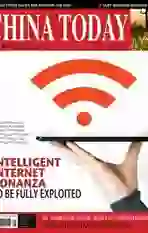China’s“New Normal”Creates More Opportunities for Cooperation
2015-07-09
CHINA geared down its growth goal this year, which, at seven percent, is still a lofty one. At the cost of shaving 0.4 percent off last years economic increment rate, China intends to achieve industrial upgrading, and improvement in the quality and efficiency of economic development that is sustainable in terms of the environment and other factors. It is, therefore, a worthwhile deal.
This prospect, which is known as the “new normal,” is expected to unleash new highlights in Chinas cooperative ties with countries across the world. Recently, China Today reporters sat down with Uruguayan Ambassador to China, Rosarjo Portell, seeking her opinions on Chinas 2015 growth, its “new normal” and bilateral ties.
China Today: Since China set its 2015 growth goal at seven percent, some foreign commentators have expressed the concern that the Chinese economy is slowing down. Whats your opinion on this issue? Whats the im- pact on Uruguay?
Ms. Portell: There has been much talk of Chinas seven percent growth goal. But anyone who has followed the world situation and the growth of other countries in recent years wont call this a slow-down, as the rate in most major developing economies is below 1.5 percent. It is, of course, slower when compared with the two-digit gains a few years ago, but we must face the economic reality of the wider world.
If we took a hard look at the trends in Chinas domestic market, we would all agree that this country is in a good position to continue development and maintain economic stability through painstaking work and hefty adjustment to its finances and budgets.
In fact, a growth of seven percent for a population of 1.37 billion can hardly be seen as an economic slump. On the contrary, China, an emerging economy, is plowing its way to the forefront of the worlds economies.
China Today: How is Chinas economic “new normal” seen in Uruguay?
Ms. Portell: Some analysts claim that this “new normal,” proposed under the framework of Chinas economic reforms and opening-up, may cause problems for other developing countries. But I see it as a great opportunity for Uruguay, which produces quality products, foods in particular. Chinas development opens the door to more and better exchanges with my country.
The “new normal” will have a positive impact on the Sino-Uruguayan relationship, ushering it into a new era. We are now on the cusp of this new era. Regarding import and export, Chinese demands mesh with Uruguayan supply. A developing China has higher demands for quality products and services, which it can find in Uruguay.endprint
For some time, the view that Uruguay couldnt possibly meet the rampant demand from Chinese buyers prevailed. It is not so today. China needs products and services of superior quality, and Uruguay can provide them. Uruguay-made software for banks is adopted by most financial institutions across Latin America, and has recently been sanctioned in Europe. Japan and the U.S. are also key markets for this product, testifying the credibility of our production and service. We are also working towards the recognition of Chinese consumers and longterm cooperation with them.
China Today: What is the state of China-Uruguayan relations at present?
Ms. Portell: Our economic ties are always on our minds, but political ties are also important as they decide whether trade relations can grow in a sustained manner. Exchanges and cooperation through international organizations are critical to establishing common interests and strategies. Uruguay is applying to be a non-permanent member of the UN Security Council. Last year a Uruguayan delegation visited China and met with officials of Chinas foreign ministry, during which they elaborated on Uruguays goal and expressed its will to learn from China, as a permanent member of the Security Council.
China Today: In which other fields can our two countries cooperate?
Ms. Portell: In some fields that hold significance for China, like the environment, I believe Uruguay can be of help. We have a slogan in Uruguay “encasing nature,”meaning better protection and management of the natural environment, including water resources.
Uruguay abounds in rivers. We developed water purification technology many years ago, and put it into use for the UNs peacekeeping missions in circumstances where drinking water is not accessible. We have cultivated rich experience in this regard.
Bilateral cooperation is also possible in the field of animal husbandry. In cattle farming, for instance, Uruguay is mature in the application of quality tracking systems, which cover all cattle in the country, each given an ID number.
Over the past years, Uruguay has put much effort into food safety, and has garnered rich experience and expertise in this realm, which we would love to share with China. I am proud that smoking is completely banned in Uruguay. It is not lip service. The ban enhances our quality of life and gives us better protection. It also instills the notion into the young generation that they are entitled to a healthy living environment.endprint
China Today: What expectations does Uruguay hold for China in other spheres?
Ms. Portell: Thank you for asking this question. There are three fields to be highlighted: products, services, and investment. We have seen a pick-up in our food exports, but expect more, given the growth potential and our strength in this area. We have many more products as yet unknown to Chinese consumers. For instance, Uruguay is advanced in the production of edible oils, such as olive oil, and the meat and dairy industries.
There is bigger space for cooperation in the service sector. We have to demonstrate to Chinese people that Uruguay is also a worthy tourist destination in Latin America. That our neighbor Brazil will host the 2016 summer Olympics offers a good chance for foreign tourists to visit my country. Stable economic and political situations and a sound legal system are also our advantages. A strong democracy contributes to a stable financial system, offering guarantees for foreign investments.
The third point I want to make is Chinese investment in Uruguay. Uruguay is the natural gateway to Latin America for foreign capital. We have harbors and airports, and whats more, a location of strategic significance. Thanks to the development of the world logistics industry, it is now more convenient to process raw materials in their countries of origins and export from there rather than ship them across borders for such operations.
Meanwhile, Uruguay, with its eco-diversity, beautiful natural scenes, ample sunshine and convenient transport, is becoming a location increasingly favored by international movie makers and commercial producers. This is a little-known fact so far to Chinese people, and one to which we hope to draw their attention.endprint
